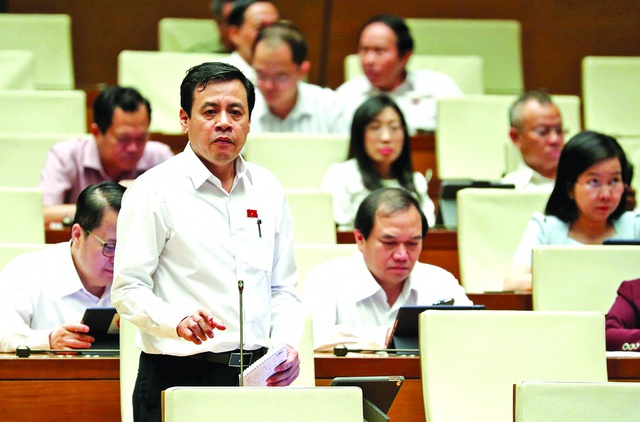In an interview with the Bank Times reporter, National Assembly Deputy Tran Anh Tuan from Ho Chi Minh City shared his insights on the upcoming amendments to the Law on Credit Institutions.
Sir, the amendments to the Law on Credit Institutions are expected to facilitate capital flow and enhance the safety of the banking system. What are your thoughts on the draft law?
I strongly agree with the proposed amendments to the Law on Credit Institutions. The draft introduces breakthrough content, focusing on three key aspects: enhancing decentralization and delegation of authority to the State Bank of Vietnam (SBV); legalizing the provisions of Resolution 42 for more effective bad debt handling; and improving the mechanism for seizing secured assets. These changes will not only facilitate the operations of credit institutions but also strengthen the responsibility of the SBV and credit institutions in addressing issues related to bad debts and secured assets.
I believe that with these new regulations, the banking system will operate more safely, and capital will be efficiently unblocked, thereby contributing positively to the country’s socio-economic development.

National Assembly Deputy Tran Anh Tuan
One of the important amendments is the delegation of authority to the SBV, especially in deciding on special loans, including cases without collateral and applying a 0% interest rate. What are your thoughts on this mechanism, and do you have any suggestions for more flexibility in applying interest rates?
I strongly agree with the provision in Clause 1, Article 1, which amends and supplements Clause 1, Article 193 of the draft, transferring the authority to decide on special lending from the Government to the SBV. This decentralization gives the SBV more autonomy and enables it to promptly handle emergency situations, such as liquidity issues, restructuring, or providing support for the recovery of credit institutions’ operations. Notably, the provision allowing the SBV to decide on special loans with a 0% interest rate, with or without collateral, is a significant step forward, facilitating support for credit institutions in exceptional circumstances.
However, I believe that fixing the interest rate at 0% for special loans might be somewhat inflexible, as the conditions of credit institutions vary widely in terms of liquidity, business performance, and debt repayment capacity. Hence, I propose that the SBV be granted more flexibility in determining interest rates, not limited to 0% but considering low-interest rates, such as 1% to 2%, or below the current discount, re-discount, and refinancing rates. This would provide more options to support credit institutions according to their creditworthiness and actual circumstances.
Delegating the authority to the Governor of the SBV to decide on these interest rates will ensure that support policies are more practical and offer flexible solutions to address the banking system’s issues. This will not only help credit institutions overcome difficulties but also ensure efficient capital utilization, contributing to economic growth targets.
The draft law also mentions the mechanism for seizing secured assets. What is your assessment of this provision, and do you have any suggestions to ensure a smooth and compliant asset seizure process?
The regulation on the right to seize secured assets is necessary and reasonable. Accordingly, when the securing party or the party holding the secured asset does not voluntarily hand over the asset to the credit institution, foreign bank branch, or debt trading and handling organization, these organizations have the right to seize the secured asset according to the law. This enhances the rights of credit institutions in handling bad debts and ensures that capital returns to business and production activities.
However, currently, Clause 5 of Article 198a stipulates that the People’s Committee and the Police of the communal level are responsible for ensuring security and order during the asset seizure process. However, if we wait until there is a disturbance to request the intervention of local authorities, the situation may have already escalated.
Therefore, I propose adding a requirement for credit institutions, foreign bank branches, or debt trading and handling organizations to coordinate beforehand with the People’s Committee and the Police of the communal level when proceeding with asset seizure, especially if they anticipate non-cooperation from the party holding the secured asset. Prior coordination will ensure a safe and orderly seizure process, preventing potential risks. Conversely, if the party holding the secured asset cooperates, the seizure can proceed normally without direct intervention from the authorities. This regulation will enhance enforcement effectiveness, minimize risks, and strengthen credit institutions’ confidence in exercising their right to seize secured assets.
Regarding the disposal of secured assets, some opinions suggest prioritizing the interests of credit institutions in the auction process. What is your perspective on this issue?
I fully agree with the representatives’ opinions on prioritizing the interests of credit institutions when disposing of secured assets, as stipulated in Clause 2, Article 198a. Credit institutions are the direct recipients of secured assets under the security contract, so they should be given the highest priority in auctioning the assets to recover capital. This not only helps credit institutions unblock capital but also protects the interests of depositors, as banks’ capital mobilization primarily relies on people’s deposits.
However, to ensure fairness and avoid disputes in handling secured assets, I propose clearly defining the regulations on the order and procedures for asset auctions, especially when multiple agencies are involved. Currently, there are still some challenges in the actual implementation process, such as delays in inter-agency coordination, prolonging the time for asset handling.
Therefore, the draft law should provide more specific provisions on the level of priority given to credit institutions and strengthen inter-agency coordination mechanisms to ensure a swift, transparent, and fair auction process. This will enable credit institutions to recover capital more effectively, thereby continuing to contribute to socio-economic development and reducing legal disputes related to secured assets.
Sir, with your passionate suggestions, what impact do you expect these amendments to the Law on Credit Institutions to have on the banking system and the economy?
With the proposed amendments, I expect the Law on Credit Institutions to establish a robust legal framework, enabling the banking system to operate more safely, efficiently, and flexibly. The delegation of authority to the SBV, especially in special lending with flexible interest rates, will facilitate the swift resolution of liquidity and restructuring issues of credit institutions, thereby supporting production, business, and economic growth.
At the same time, the regulations on seizing and handling secured assets, along with the legalization of Resolution 42, will expedite bad debt handling and unblock stagnant capital, returning resources to the economy. These changes will not only benefit credit institutions but also protect the interests of depositors and strengthen confidence in the financial and banking system.
I believe that if the suggestions on inter-agency coordination, prioritizing credit institutions’ interests, and increasing flexibility in applying interest rates are considered and incorporated into the law, the banking system will become more sustainable, positively contributing to the country’s socio-economic growth objectives in the next phase.
Thank you, sir, for your valuable insights!
“Billions Pour into Real Estate, but Companies Still Starve for Capital: Unveiling the Capital Conundrum”
As of the end of March, real estate business credit balances had surged by 20% compared to the end of 2024. This growth aligns with the recovering real estate market trend. However, it is crucial to carefully manage and direct capital flows into segments that align with the purchasing power of the population to mitigate risks.
The Supreme People’s Court Requests Chief Justice to Respond to Provincial People’s Council’s Questions
The Supreme People’s Court of Vietnam has proposed retaining a provision in the draft resolution amending and supplementing several articles of the Constitution. The proposal suggests that the chief justices of provincial-level courts should continue to be accountable to the People’s Councils through a question-and-answer session.
Extraordinary General Meeting of Eximbank: Awaiting State Bank Approval to Relocate Head Office and Elect Three New Supervisory Board Members
On February 26, 2025, the Joint Stock Commercial Bank for Foreign Trade of Vietnam (Eximbank, HOSE: EIB) held an extraordinary general meeting to elect new members to its Supervisory Board and amend the bank’s charter.





















